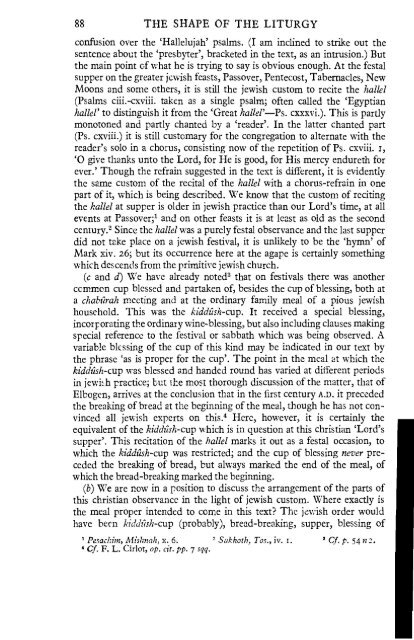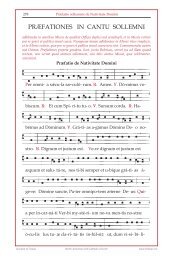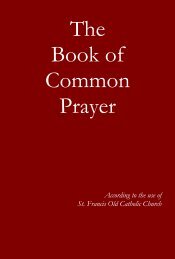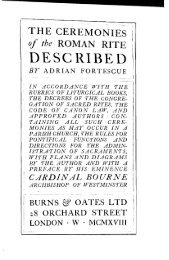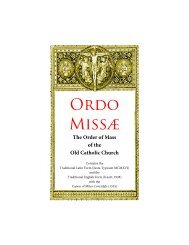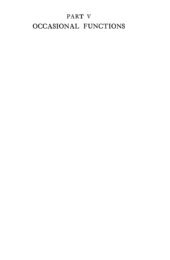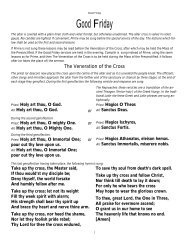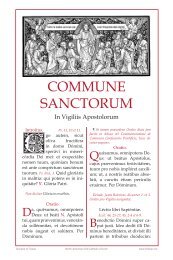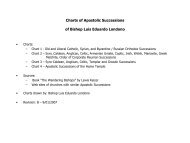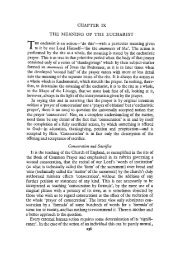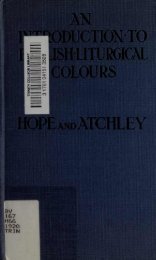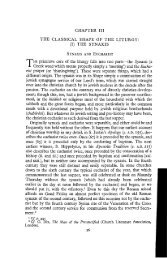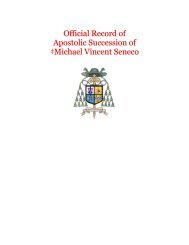Eucharist and Lord's Supper
Eucharist and Lord's Supper
Eucharist and Lord's Supper
Create successful ePaper yourself
Turn your PDF publications into a flip-book with our unique Google optimized e-Paper software.
88 THE SHAPE OF THE LITURGY<br />
confusion over the 'Hallelujah' psalms. (I am inclined to strike out the<br />
sentence about the 'presbyter', bracketed in the text, as an intrusion.) But<br />
the main point of what he is trying to say is obvious enough. At the festal<br />
supper on the greater jewish feasts, Passover, Pentecost, Tabernacles, New<br />
Moons <strong>and</strong> some others, it is still the jewish custom to recite the lzalle/<br />
(Psalms ciii.-cxviii. taken as a single psalm; often called the 'Egyptian<br />
hallel' to distinguish it from the 'Great hallel'-Ps. cxxxvi.). This is partly<br />
monotoned <strong>and</strong> partly chanted by a 'reader'. In the latter chanted part<br />
(Ps. cxviii.) it is still customary for the congregation to alternate with the<br />
reader's solo in a chorus, consisting now of the repetition of Ps. cxviii. I,<br />
'0 give thanks unto the Lord, for He is good, for His mercy endureth for<br />
ever.' Though the refrain suggested in the text is different, it is evidently<br />
the same custom of the recital of the hallel with a chorus-refrain in one<br />
part of it, which is being described. We know that the custom of reciting<br />
the hallel at supper is older in jewish practice than our <strong>Lord's</strong> time, at all<br />
events at Passover;l <strong>and</strong> on other feasts it is at least as old as the second<br />
century.2 Since the lzallel was a purely festal observance <strong>and</strong> the last supper<br />
did not take place on a jewish festival, it is unlikely to be the 'hymn' of<br />
Mark xiv. 26; but its occurrence here at the agape is certainly something<br />
which descends from the primitive jewishchurch.<br />
(c <strong>and</strong> d) We have already noted 3 that on festivals there was another<br />
cemmon cup blessed <strong>and</strong> partaken of, besides the cup of blessing, both at<br />
a chablirah meeting <strong>and</strong> at the ordinary family meal of a pious jewish<br />
household. This was the kiddilsh-cup. It received a special blessing,<br />
incorporating the ordinary wine-blessing, but alsoincluding clausesmaking<br />
special reference to the festival or sabbath which was being observed. A<br />
variable blessing of the cup of this kind may be indicated in our text by<br />
the phrase 'as is proper for the cup'. The point in the meal at which the<br />
kiddush-cup was blessed <strong>and</strong> h<strong>and</strong>ed round has varied at different periods<br />
in jewish practice; but the most thorough discussion of the matter, that of<br />
Elbogen, arrives at the conclusion that in the first century A.D. it preceded<br />
the breaking of bread at the beginning of the meal, though he has not convinced<br />
all jewish experts on this. 4 Here, however, it is certainly the<br />
equivalent of the kidditsh-cup which is in question at this christian '<strong>Lord's</strong><br />
supper'. This recitation of the hallel marks it out as a festal occasion, to<br />
which the kiddush-cup was restricted; <strong>and</strong> the cup of blessing never preceded<br />
the breaking of bread, but always marked the end of the meal, of<br />
which the bread-breaking marked the beginning.<br />
(b) Weare now in a position to discuss the arrangement of the parts of<br />
this christian observance in the light of jewish custom. Where exactly is<br />
the meal proper intended to come in this text? The jewish order would<br />
have been kiddfish-cup (probably), bread-breaking, supper, blessing of<br />
1 Pesachim, Mishnah, x. 6. ' Sukkoth, Tos., iv. 1. • Cf·p. 54112.<br />
• Cj. F. L. Cidot, op. cit. pp. 7 sqq.


